Foreign Trade and Transport in Mozambique, Maputo
Mozambique (Business): Nampula, Quelimane, Pemba, Transport corridors

Mozambique (Republica de Moçambique in Portuguese) is an East African country
- Maputo is the economic, political and administrative capital of Mozambique and the largest Mozambican city
- Largest cities of Mozambique: Maputo, Beira, Nampula, Tete, Quelimane, Chimoio, Pemba, Inhambane, Xai-Xai and Lichinga.
- Mozambique is one of the most dynamic African markets
- Main economic activity in Mozambique: agriculture
- Mozambican agriculture sector: 70% of the population
- Tourism sector is also expanding
- Main mineral resources: titanium, graphite, carbon, aluminium,
beryllium and tantalum
- Mozambique is the second African aluminium producer after South Africa
- In 2012, large natural gas reserves were discovered in
Mozambique
- This could make Mozambique one of the largest liquefied natural gas producers in the world.
- South Africa is the Mozambican main trading partner
- More than 1,200 public companies have been privatised
- Mozambique is one of the poorest countries in the world
- Mozambique share borders with South Africa (491 kilometres), Malawi (Blantyre, Mzuzu and Lilongwe), Eswatini (Swaziland), Tanzania, Zambia and Zimbabwe
- Mozambique is separated from Madagascar by the Mozambique Channel to the east.
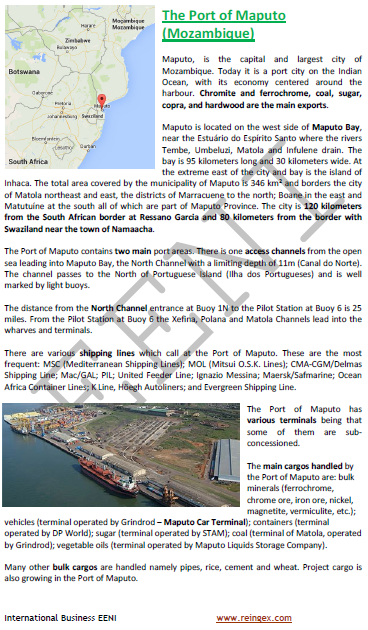
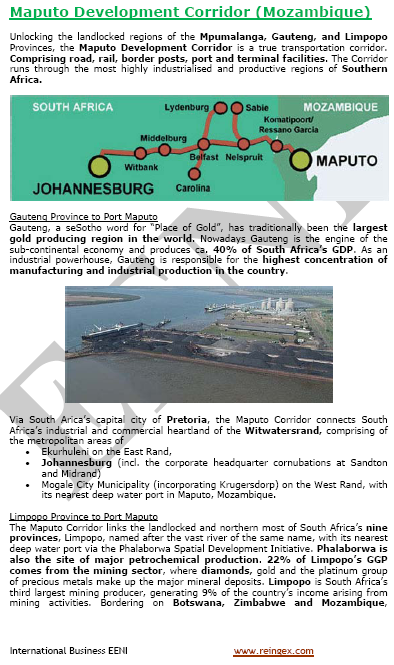
 Mozambique
Mozambique


More information: International Trade and Business in Mozambique, at EENI Global Business School.
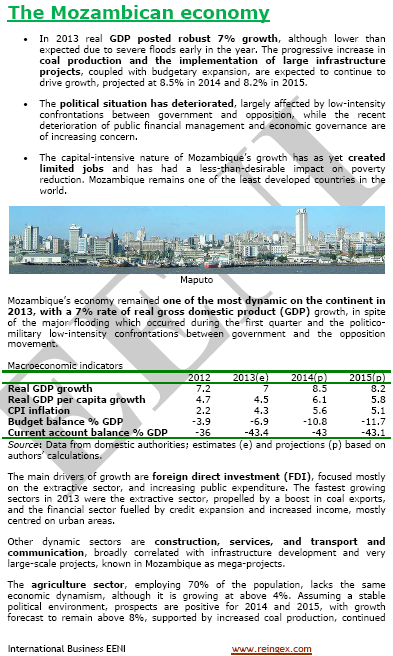

Trade and Business Organisations (Mozambique)
- Southern African Development Community (SADC)
- COMESA-EAC-SADC Agreement
- IORA
- Conference on the Great Lakes Region (guest member country)
- Southern African Customs Union and Mozambique (SACUM)
- United Kingdom-SACU and Mozambique Economic Partnership Agreement
- International Organization of La Francophonie (OIF)
- Community of Portuguese Language Countries
- Global System of Trade Preferences
- African Union
- AUDA-NEPAD
- Economic Commission for Africa
- African Development Bank
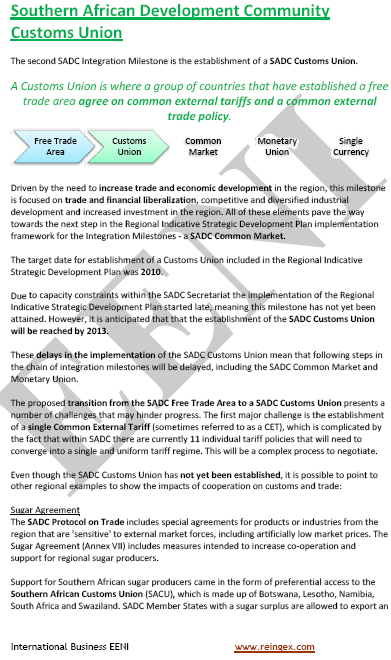
- Mozambican population: 29 million people
- Mozambican Population density: 28.7 inhabitants / km²
- Mozambique has a tropical climate with two seasons
- Area of Mozambique: 801,590 km²
- Most important river: Zambezi
- Mozambique has four lakes: Lake Niassa (or Malawi), Lake Chiuta, Lake Cahora Bassa and Lake Shirwa
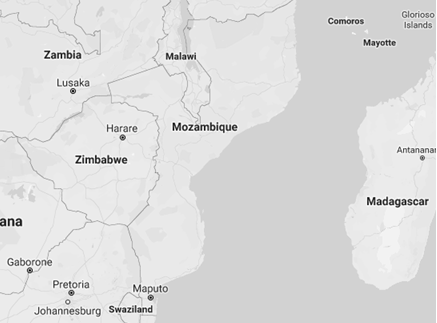
- Mozambique is a unitary semi-presidential constitutional republic
- Mozambique obtained its Independence from Portugal in 1975 (History of Mozambique)
- Calling code of Mozambique: 258
- Country code top-level domain of Mozambique: .mz
- Currency of Mozambique: Metical (gold bracelet)
Mozambique is divided into ten provinces and a capital (Maputo) with a provincial status. The provinces are subdivided into 129 districts.
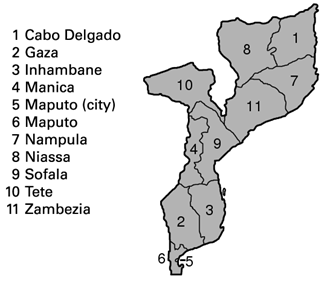
The north-central provinces of Zambezia and Nampula are the most populated (45% of the population)
The provinces of Mozambique are (population in millions people):
Northern Mozambique
Cabo Delgado
- Capital: Pemba
- Area: 61.661
- Population: 1,9
Nampula
- Capital: Nampula
- Area: 81.606
- Population: 6
Niassa
- Capital: Lichinga
- Area: 129.056
- Population: 1,9
Zambezia
- Capital: Quelimane
- Area: 10.008
- Population: 5,1
Central Mozambique
Manica
- Capital: Chimoio
- Area: 61.661
- Population: 1,9
Sofala
- Capital: Beira
- Area: 68.018
- Population: 2,2
Tete
- Capital: Tete
- Area: 100.724
- Population: 2,7
Southern Mozambique
Gaza
- Capital: Xai-Xai
- Area: 75.709
- Population: 1,3
Inhambane
- Capital: Inhambane
- Area: 68.615
- Population: 1,1
Maputo City
- Area: 347
- Population: 1,1
Maputo
- Capital: Matola
- Area: 26.011
- Population: 2,5
Main Mozambican ethnicities:
Main Mozambican ethnic group: Bantu (98% of the population).
- Macua are the dominant group in northern regions of Mozambique (4 million)
- Seine and Shona (Ndau) occupy an important area in the Zambezi Valley
- Shangaan (Tsonga) dominate in South of Mozambique.

Religions and Global Business -
Religious diversity
Religions in Mozambique:
- Catholic Christianity (56% of the Mozambican population)
- Sunni Islam (18%)
- African Traditional Religions
The official language of Mozambique is Portuguese.
- Portuguese is spoken as a second language by half of the population
- Other Mozambican languages are Makhuwa, Seine and Swahili
Higher Education in Mozambique
 Mozambique
Mozambique
 Mozambique
Mozambique
 Moçambique
Moçambique


 Tweet
Tweet